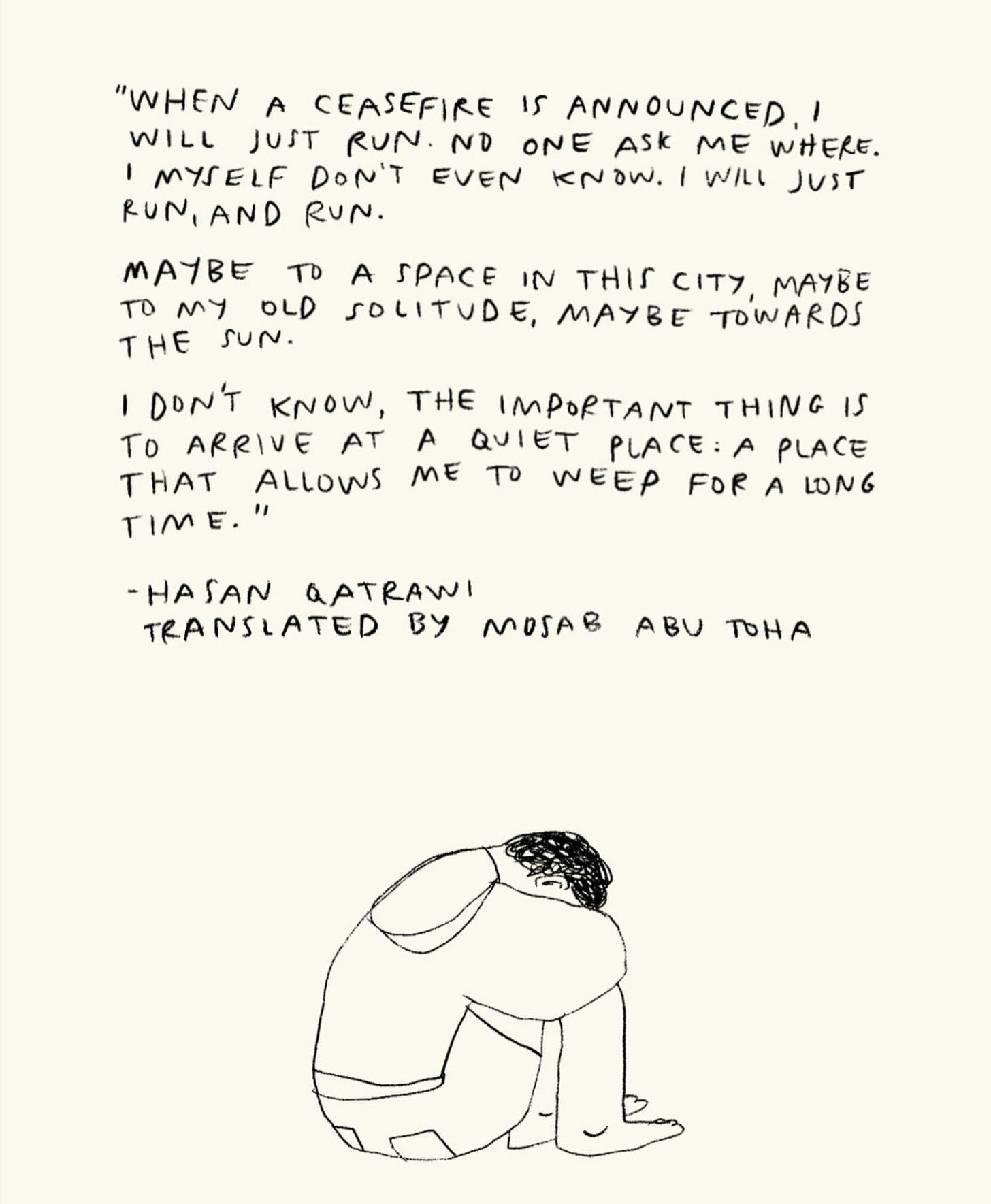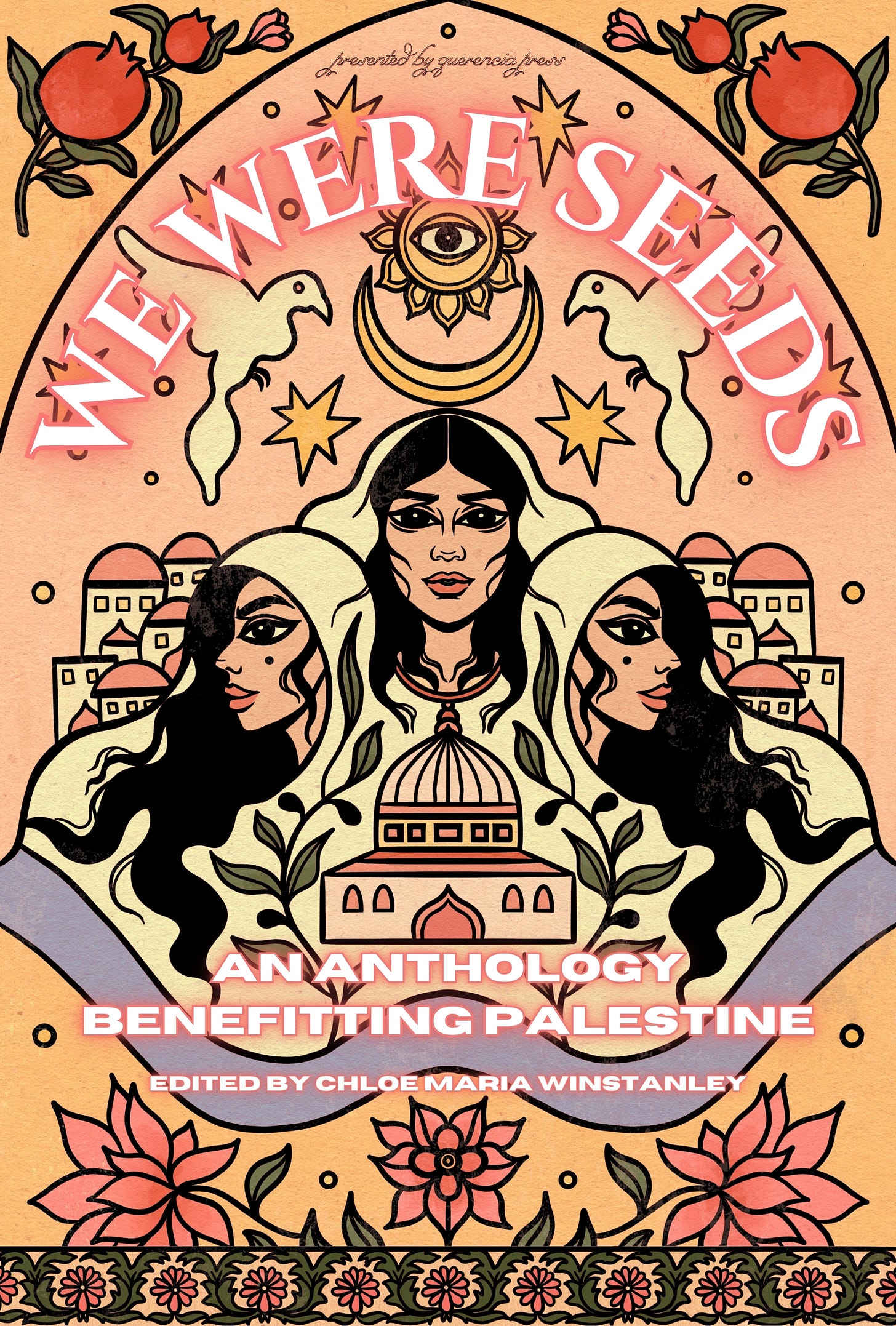We Were Seeds: An Anthology of Poetry for Palestine
Introducing a newly published book that features two of my poems. All proceeds are going to mutual aid.
A chairde,
Welcome to the first post of 2025. I'd like to preface this by saying how grateful I am for all of you. When I started this newsletter just over a year ago, I couldn't dream of sharing my words with more than 700 subscribers. Thank you for being here and uplifting me in my reclaimed passion for writing. You gave me positive feedback (that I had to learn to accept after a lifetime of being silenced) as well as critical feedback (that helped me re-examine things and grow), and your engagement encouraged me to put my writing out there further. The last few months were filled with both accepted and rejected submissions and I'm trying to learn a lesson from all of them.
The book of poetry I want to introduce you to today is We Were Seeds - An Anthology Benefitting Palestine, published by Querencia Press. As I'm finishing these lines, mixed and deflating information about possible ceasefire keeps pouring in. It seems like Israel will once again tank the agreement despite it working in Israel's favour, allowing them to cease the carnage for only half a day and call it a “ceasefire.” Chris Hedges just wrote a good overview of why the whole announcement doesn't leave much room for optimism ("The Ceasefire Charade") and emphasised that Israel's objective remains — that is, the erasure of the Palestinian people.
Historically, as Ireland knows all too well, ceasefires often resulted in placating activism, equating the oppressed and the oppressor, and normalisation of status quo, instead of leading to the desired outcome of liberation. Dozens of Palestinians have been killed since the ceasefire was announced, set to kick in with a delay of four days, not to mention that there’s no word about stopping the attacks on the West Bank. None of us knows what will happen today, tomorrow, in a month, in a year's time, but we know one thing for sure — the entire planet is in a deadlock caused by unbridled lust for power and domination. Israel’s genocidal rampage doesn't exist in a vacuum, it exists as a symptom of a profoundly sick world.

We have to resist hierarchical power structures by any means. A ceasefire, should it happen, will be a chance for Gazans to rest and mourn their dead in relative safety, but nothing changes, the struggle against land grab and other extractivist politics continues. In the light of all of this, it initially feels uneasy to tell you about poetry. I hold no illusion that poetry will massively contribute to divesting from everything we know, but I do believe that written word has a power to plant a seed of change. I remind myself that both reading and writing is our sacred duty and a part of a pathway to a different world — because you can't kill an idea. I submitted poems to this anthology after I saw the publisher’s call centred Palestinian voices first, then Jewish anti-Zionist voices, and other voices were secondary. This is important to me and I always want to make sure Palestinian voices are heard on Palestinian matters. Our solidarity and writing in solidarity are necessary, bbut they can’t come at the expense of those whose lived experience should steer the direction of the liberation movement.
We Were Seeds anthology includes 60 different, yet united voices, transcending borders, religion, race, gender, from Palestine and her disapora to the Arab world and India, from Turtle Island to Aotearoa and Scotland. Established and new writers came together, from Gazan academics to Jordanian scientists, anti-Zionist Jews and stay-at-home mothers writing from the belly of the beast. It was an honour to stand alongside so many fierce people. The cover was created by Elli Zogia (Ez Naive), a Greek artist living and creating on the unceded lands of the Coast Salish Peoples. Crucially, this anthology is not for profit and all proceeds go to The Sameer Project and mutual aids on Gaza Funds. Two of our Palestinian contributors, Eman Alhaj Ali and Dua'a Almadhoun, are currently displaced and I’d like to urge you to consider sharing and donating directly to them if you can. The book is available in both digital and printed editions.
As for my own poems in this anthology, one of them, My Sister, might already be familiar to my older readers. My second poem, The Hands of Gaza, is a new piece I wrote as a reminder that Gazans shouldn't be seen with pity, as victims, but as resilience and perseverance embodied. You can read it below.
Grá agus saoirse
(love and freedom),
Ramona
The Hands of Gaza
Tell me. Tell me of the young man and his bride who married just two days before the first bomb fell. Tell me of the bride's beautiful smile when she wore her heirloom silver. Do not tell me of how she looked when they pulled her from the rubble just a week after the first bomb fell. That is not how her mother would want us to remember. Tell me of her grandmother's eyes full of pride when she passed on her most prized belonging, the only tatreez dress she saved when she lost her home in 1948. Do not tell me to pity the old woman for carrying the pain of the Nakba. That is not how the bride would want us to remember the strongest woman she ever knew. Tell me. Tell me of the children who lived behind the corner, of the boy who loved cars and orange slices. His father would not want us to remember him as a bag of limbs. Tell me of the little girl who fell in love with a pottery wheel. Tell me what her hands have created. Her sister, the last of her family, would want us to remember the gift she had. Tell me of hands like hers. Tell me of hands that painted in Gaza. Tell me of hands that wrote in Gaza. Tell me of hands that built Gaza. Tell me of hands that held hope.






Absolutely right - to write, if one is able to, is a sacred duty in times like these. A wonderful effort with the anthology and a beautiful poem.
What a beautiful, moving poem Ramona. The book looks wonderful.❤️🕊️,Dx